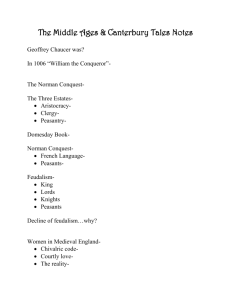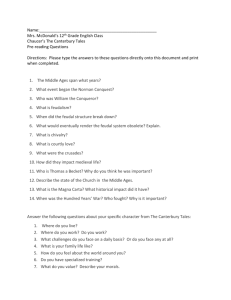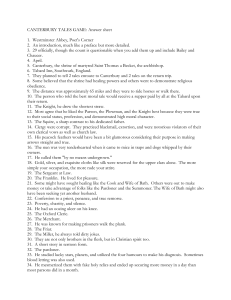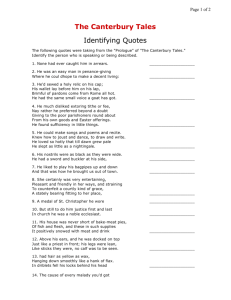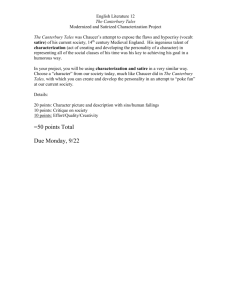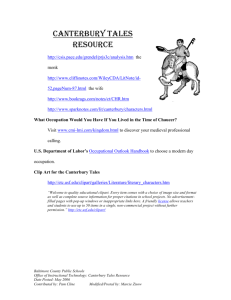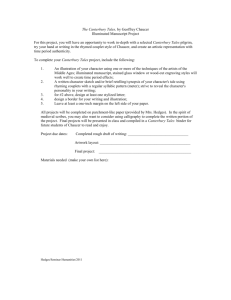The Prologue to The Canterbury Tales
advertisement
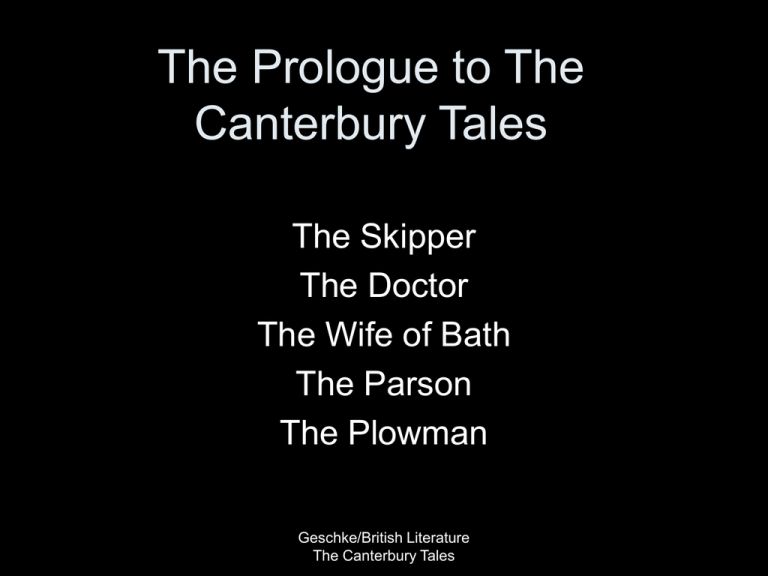
The Prologue to The Canterbury Tales The Skipper The Doctor The Wife of Bath The Parson The Plowman Geschke/British Literature The Canterbury Tales The Skipper Geschke/British Literature The Canterbury Tales The Skipper Geschke/British Literature The Canterbury Tales The Skipper • Characterization – Diction • “He rode a farmer’s horse as best he could” (394) – Not a good horseman Geschke/British Literature The Canterbury Tales The Skipper • “And certainly he was an excellent fellow” (394) – Chaucer thinks highly of him – Truthful? Geschke/British Literature The Canterbury Tales The Skipper • “Many a draft of vintage, red and yellow, He’d drawn at Bordeaux, while the trader snored.” (400-401) – Steals wine – Imagery • Pirate? Geschke/British Literature The Canterbury Tales The Skipper • “If, when he fought, the enemy vessel sank, He sent his prisoners home; they walked the plank” (403-404) – Irony • – The home of the enemy sailors – the bottom of the sea Imagery • Pirate? Geschke/British Literature The Canterbury Tales The Skipper • “As for his skill in reckoning his tides, Currents and many another risk besides, Moons, harbours, pilots, he had dispatch That none from Hull to Carthage was his match.” (405-408) – Talented sailor Geschke/British Literature The Canterbury Tales The Skipper • Purpose of the Diction – Demonstrates Chaucer’s respect for the Skipper • Why? – Skipper, although ruthless, is a professional and does his job well Geschke/British Literature The Canterbury Tales The Skipper • Our Reaction to the Skipper – – – not a strong reaction we might not like him reminds us of a pirate Geschke/British Literature The Canterbury Tales The Doctor Geschke/British Literature The Canterbury Tales The Doctor • Characterization – Diction • “A Doctor too emerged as we proceeded; No one alive could talk as well as he did On points of medicine and of surgery, For, being grounded in astronomy, He watched his patient closely for the hours When, by his horoscope, he know the powers Of favorable planets, then ascendant, Worked on the images for his dependent. The cause of every malady you’d got He knew, and whether dry, cold, moist or hot; He knew their seat, their humour and condition. He was a perfect practicing physician.” (415-426) Geschke/British Literature The Canterbury Tales The Doctor • The use of astrology in medicine was common Medieval medicine was based on the classical notion of four humors (blood, choler, phlegm, and black bile) • – – People believed that diseases were caused by an imbalance in these humors Diseases were cured by restoring this balance Geschke/British Literature The Canterbury Tales The Doctor • “In his own diet he observed some measure; There were no superfluities for pleasure, Only digestives, nutritives and such. He did not read the Bible very much.” (433-436) Geschke/British Literature The Canterbury Tales The Doctor • Different than the gluttonous Franklin – – – The Doctor eats a well-balanced diet He avoids excess for pleasure However, he lacks spiritual nourishment • does not read the Bible Geschke/British Literature The Canterbury Tales The Doctor • “In blood-red garments, slashed with bluish grey And lined with taffeta, he rode his way” (437-438) – Dresses well Geschke/British Literature The Canterbury Tales The Doctor • “Yet he was rather close as to expenses And kept the gold he won in pestilences. Gold stimulates the heart, or so we’re told. He therefore had a special love of gold.” (439-442) Geschke/British Literature The Canterbury Tales The Doctor • • The Doctor is frugal with the money he earned for treating the sick He believes that gold is good for the heart Geschke/British Literature The Canterbury Tales The Doctor • Purpose of the Diction – Demonstrates that the Doctor is good at what he does – Demonstrates that the Doctor is moneyhungry Geschke/British Literature The Canterbury Tales The Doctor • Our Reaction to the Doctor – We do not like him because of his greed Geschke/British Literature The Canterbury Tales The Wife of Bath Geschke/British Literature The Canterbury Tales The Wife of Bath • Characterization – Diction • “In making cloth she showed so great a bent She bettered those of Ypres and of Ghent.” (445-446) – Talented in making clothing – Well dressed Geschke/British Literature The Canterbury Tales The Wife of Bath • “In all the parish no a dame dared stir Towards the altar steps in front of her, And if indeed they did, so wrath was she As to be quite put out of charity.” (447-450) – Gets angry if anyone else is in front of her at church Geschke/British Literature The Canterbury Tales The Wife of Bath • “Her hose were of the finest scarlet red And gartered tight; her shoes were soft and new. Bold was her face, handsome and red in hue.” (454-456) – Symbolism • Red – Passion Geschke/British Literature The Canterbury Tales The Wife of Bath • “She’d had five husbands, all at the church door, Apart from other company in youth; No need just now to speak of that, forsooth.” 458-460) – Had numerous husbands – Had numerous lovers in her youth Geschke/British Literature The Canterbury Tales The Wife of Bath • “And she had thrice been to Jerusalem, Seen many strange rivers and passed over them; She’d been to Rome and also to Boulogne, St. James of Compostella and Cologne, And she was skilled in wandering by the way.” (461-465) Geschke/British Literature The Canterbury Tales The Wife of Bath • • She has been on numerous pilgrimages “skilled in wandering by the way” – – Avoids the straight and narrow path She is good at dalliance • to deal lightly or carelessly • to flirt Geschke/British Literature The Canterbury Tales The Wife of Bath • “She had gap-teeth, set widely, truth to say” (466) – Symbolism • Gapped teeth – Amorousness » full of or showing love or sexual desire Geschke/British Literature The Canterbury Tales The Wife of Bath • Purpose of Diction – – Demonstrates that the Wife of Bath is a hypocrite Mocks her for her lifestyle Geschke/British Literature The Canterbury Tales The Wife of Bath • Our Reaction – – – We do not like her We laugh at her One of the most memorable characters in The Canterbury Tales Geschke/British Literature The Canterbury Tales The Parson Geschke/British Literature The Canterbury Tales The Parson • Characterization – Diction • “A holy-minded man of good renown There was, and poor, the Parson to a town, Yet he was rich in holy thought and work.” (475-477) – Paradox » Poor in material goods (secular), but rich in holy goods (heavenly) Geschke/British Literature The Canterbury Tales The Parson • “Wide was his parish, with houses far asunder, Yet he neglected not in rain or thunder, In sickness or in grief, to pay a call On the remotest, whether great or small, Upon his feet, and in his hand a stave.” (489-493) – Committed to his ministry – Helps other people Geschke/British Literature The Canterbury Tales The Parson • “That if gold rust, what then will iron do? For if a priest be foul in whom we trust No wonder that a common man should rust…” (498-500) – Symbolism • • • • Gold=clergy Iron=parishioners Clergy should be more pure than parishioners Priest should be a good example Geschke/British Literature The Canterbury Tales The Parson • “The true example that a priest should give Is one of cleanness, how the sheep should live.” (501-502) – Christian imagery • • Good Shepherd – Christ Sheep – Followers of Christ Geschke/British Literature The Canterbury Tales The Parson • “His business was to show a fair behaviour And draw men thus to Heaven and their Saviour” (515-516) – Not a hypocrite Geschke/British Literature The Canterbury Tales The Parson • “I think there never was a better priest. He sought no pomp or glory in his dealings, No scrupulosity had spiced his feelings. Christ and His Twelve Apostles and their lore He taught, but followed it himself before.” (520-524) – A genuinely good clergyman Geschke/British Literature The Canterbury Tales The Parson • Purpose of the Diction – – – Demonstrates that the Parson is a good man Looks out for the members of his parish Antithesis of Friar and Monk Geschke/British Literature The Canterbury Tales The Parson • Our Reaction to the Parson – – We like him Intensifies our feelings of dislike regarding the Friar and Monk Geschke/British Literature The Canterbury Tales The Plowman • Characterization – Diction • “There was a Plowman with him there, his brother” (525) – Brother to the Parson » Literal (actual brother of the Parson) » Symbolic (brother in Christ?) Geschke/British Literature The Canterbury Tales The Plowman • “He was an honest worker, good and true, Living in peace and perfect charity, And, as the gospel bade him, so did he, Loving God best with all his heart and mind And then this neighbour as himself,…” (528-532) – Follows laws of the Church – Good man Geschke/British Literature The Canterbury Tales The Plowman • “He paid his tithes in full when they were due On what he owned, and on his earnings too.” (539-540) – Tithes • – A church tax consisting of one tenth of one’s income Honest person Geschke/British Literature The Canterbury Tales The Plowman • Purpose of the Diction – – Demonstrates that the Plowman is a good man Reminds us of what a good person the Parson is as well (because of the brotherly relationship) Geschke/British Literature The Canterbury Tales The Plowman • Our Reaction to the Plowman – – We like him Not a very memorable character Geschke/British Literature The Canterbury Tales

